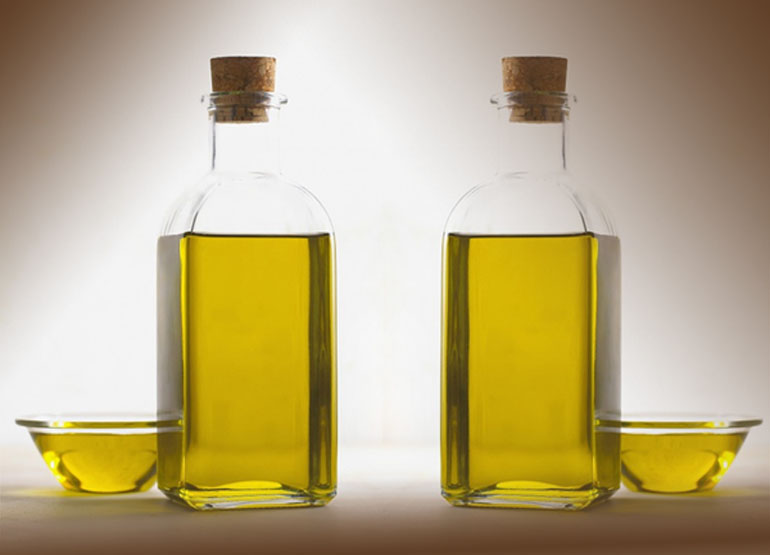Health Pages
Unsaturated Fat
Unsaturated Fats
All fats and oils are a mixture of saturated fatty acids and unsaturated fatty acids. Fats and oils are categorized according to the number and bonding of the carbon atoms in the aliphatic chain. Unsaturated fat is a fatty acid in which there is at least one double bond within the fatty acid chain. A fatty acid chain is monounsaturated if it contains one double bond, and polyunsaturated if it contains more than one double bond.
The greater the degree of unsaturation in a fatty acid (i.e., the more double bonds in the fatty acid) the more vulnerable it is to lipid peroxidation (rancidity). Rancid oils can be very harmful to eat, but antioxidants can protect unsaturated fat from lipid peroxidation.
Unsaturated fats are liquid at room temperature. They come from plants and are found in vegetables, avocados, olives, nuts, soybeans, and seeds. Some fish also contain unsaturated fats. Meat products contain both saturated and unsaturated fats.
Although unsaturated fats are healthier than saturated fats, the current recommendation is that no more than 25% to 30% of our daily caloric intake come from fat.
Fatty acids that are required for good health but cannot be made in sufficient quantity from other substrates, and therefore must be obtained from food, are called essential fatty acids. There are two essential fatty acids (EFAs) in human nutrition:
 Alpha-linolenic acid (an omega-3 fatty acid) and
Alpha-linolenic acid (an omega-3 fatty acid) and
 Linoleic acid (an omega-6 fatty acid)
Linoleic acid (an omega-6 fatty acid)
Other lipids needed by the body can be synthesized from these and other fats.
POLYUNSATURATED FATTY ACIDS (PUFAs)
These are usually liquid oils of vegetable or plant origin. Some studies suggest that polyunsaturated fats tend to lower overall blood cholesterol and LDL "bad" cholesterol, if these oils replace the saturated fats you are presently using. Remember, only replace DO NOT USE MORE!
Look for oils that are organic and unrefined and avoid refined oils or RBD oils for the best health benefits. RBD oils is a name for all highly processed oils that are refined, bleached and deodorized in refining. RBD oils are produced by crushing the plant material (usually seeds) to express the oil, followed by extraction of the crushed material with a low-boiling solvent, most commonly hexane, to obtain the remainder of the oil. This gives them a good shelf life, but can severely damage the nutritional quality of the oil.
It is recommended that monounsaturated fats be used to replace the polyunsaturated fats when cooking, baking etc.
Also try to avoid highly processed seed and vegetable oils high in Omega-6, as well as the processed foods that contain them.
Common sourses:safflower, sunflower, corn, soybean, cottonseed oil, mayonnaise (depending on oil used in making it), fish, almonds, hazelnuts, pecans, and sesame seeds.
MONOUNSATURATED FATTY ACIDS (MUFAs)
Health experts agree that substituting foods rich in monounsaturated fats for saturated fats helps to decrease LDL "bad" cholesterol and increase HDL "good" cholesterol levels and thus reduce the risk of heart disease. Use in moderation, as these fats still do contribute to excess calories. Monounsaturated fats are liquid at room temperature, but they start to harden when chilled.
Common sourses: olive oil*, avocado oil, canola oil and nuts
* extra virgin olive oil has some antioxidants which may protect against heart disease and lower your risk of other cardiovascular diseases. It may also help you control your insulin levels and blood sugar.
OMEGA-3 FATS
Omega-3 fats (also known as an omega-3 fatty acids)are type of polyunsaturated fat. The very long chain Omega-3 fats found in fish oils may lover blood triglycerides, another type of blood fat. The effect on blood cholesterol is still uncertain. Omega- 3 fats also inhibit platelet aggregation. Many people supplement their diets with fish oils like cod liver oil. Dietitians are advising against this since concentrated forms of fish oils may contain toxic amounts of nutrients like vitamin A and may also contain concentrated forms of contaminants like heavy metals (i.e. arsenic, cadmium, lead and mercury) and other persistent toxic contaminants (i.e. polychlorinated biphenyls (PCBs), polychlorinated dibenzop-dioxins (PCDDs), polychlorinated diobenzofurans (PCDFs) and dioxin-like PCBs), which may cause other undesirable health effects.
If you want to increase the amount of Omega-3 fat in your diet, try eating fish more often, like two times a week. Make sure to choose a variety of fish lower in contaminants.
OMEGA-6 FATS
Most people get plenty of omega-6 fatty acids from their diets – too many, in fact, in relation to the omega-3 fatty acids. For that reason, we do not ever recommend a supplement of omega-6.
Recommended readings:
- About Fats
- Saturated Fats
- Trans Fat
- Fats and Oils
- Low Fat Diet
- Learn More About Cholesterol & Fats
- Fat Facts
- Fat Scoreboard
- Test Your Fat I.Q.
- How to Optimize Your Omega-6 to Omega-3 Ratio
- Healthy Fats vs Unhealthy Fats: What You Need to Know
- Big Fat Myths
- A Refresher on Fats
- Hydrogenated Fat Dangers
- Cholesterol and You
- Cholesterol Content of Commonly Used Food
- Diet and Eating Out



